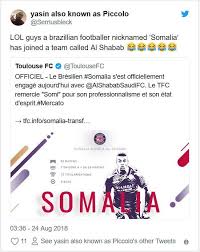

“Somalia joins Al-Shabab” is a statement doing its rounds by sports, especially football fanatics on twitter rather in a lighter sense and not in the terrorist connotation, an example of how powerful Professional African Language Translation determines the effectiveness of communication.
In this sense Somalia is a professional Brazilian football player who was formerly with the Toulouse FC team in France but recently transferred to Al-Shabab in Riyadh, Saudi Arabia.

However, one cannot miss out the elephant in the room as he shares a name with Somalia, a country in the horn of Africa that has for a decade battled with the Al-Shabad; a terrorist group linked to the notorious Al-Qaida in Afghanistan. This group has in the past carried out deadly attacks not only in Somalia but also in her neighbouring countries like Kenya and Uganda as a result of the latter sending their troops under the African Union for peace keeping purposes.
The attacks included the 2013 West Gate shopping mall attack that killed 70 people and the 2015 attack on a Garissa University College that claimed 178 people and injuring scores in Kenya. Then there was the 2010 attack on Uganda on scores of football fans that had gathered to watch the FIFA World cup finals in Kampala.
All the above points us to a major factor involved in communication and that is the way a message, service or product is received by the intended audience or market. This further sheds light on the fact that same names or words do not necessarily refer to the same thing.
In Africa alone there are over 1500 indigenous languages and although some share words and pronunciation of those words, it does not necessarily mean that the meaning of those words, names and phrases is the same.
And while many African countries share languages; there are changes in those languages to suit a particular country, region or tribe. This can be as a result of different cultures, border lines, foreign influence and the accent borrowed from their mother tongues.
Hiring professional African language translation services is one of the best choices anyone willing to reach out to Africa and vice versa should be equipped with so as for their message, product or service to be effortlessly received and this should at least include;
By Angela Kyolaba
For more information click here.